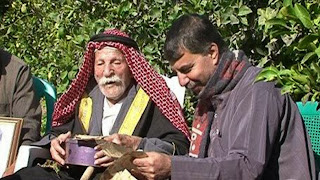Waxing poetic about the Ottomans
A year ago, Istanbul
entered my thoughts, not the modern metropolis of 13 plus million people, rather
the idea of Istanbul .
I started searching for work there via the internet, checking out rental rates in and around the
city, transport and food prices, but it was just an idea,
something to consider, an option to have.
Several events conspired to bring
me closer to this city, maybe it was fate, maybe God was trying to tell me
something, whatever the reasons were, events have brought me closer to this
city and to exploring my Ottoman heritage.
Being a Levantine Christian, such
an idea as considering the Ottomans a part of our common regional heritage is simply
unacceptable. Discussion of the Ottomans is nearly always done in disparaging
and unflattering terms and includes the listing of their numerous crimes
against the people of the region. Any discussion of the positive aspects of our
Ottoman past is discouraged if not outright forbidden by social convention.
As a Christian I was taught to
despise the Ottomans. But, like it or not, if you are a citizen of one of the
many troubled and discombobulated Middle Eastern countries, Ottoman is part of
your heritage as an Arab and as a Muslim. The Ottomans were heirs to the Muslim
Caliphate. In Lebanon and Palestine , in Syria
and Egypt and the Hejaz , they were not occupiers, although some think of
them in those terms, they were part of this complex eastern realm, this beautiful
tapestry of diversity and cultural richness. It is true they were brutal and
undemocratic, but they were the dominant elite and behaved as any dominant
elite would, but they were not occupiers.
I found that I am not alone in
thinking the way I do. Many of the older Palestinians share the view that life
under the Ottomans was happier, people were more prosperous, farmers worked the
land, they grew and sold their produce freely, businesses flourished and border
checks did not exist. This maybe due to the fact that Palestinians have never
known a really good day since the Ottoman’s were evicted from Palestine by the British in World War I. Since
then it was one bad day after the next, each one worse than the day before. And
that’s not all; Palestinians have to bear the guilt that because of their
unique and apparently insoluble problem their neighbors have also suffered instability
and war.
So, when a story appeared on
Facebook of a 125-year-old Palestinian it was not surprising to note that he
had nothing but good things to say about the Ottoman era, and he should know! This,
of course, is in direct opposition to the general view held by most Lebanese
Christians, for example, who never miss an opportunity to remind anyone who
would listen of the many injustices committed by the Ottomans.
Link to the story from Al Arabiya.net: http://english.alarabiya.net/en/life-style/2013/11/17/125-year-old-Palestinian-man-tells-memories-from-peaceful-days.html
I sometimes wonder how different the
modern story of our long suffering region would have changed had the Ottoman
Sultan not been week and ineffectual, but instead had not allowed quasi-fascist
elements within the empire to take that ill fated decision of entering WWI on the
side of Germany and Austria. Would we still be citizens of an empire, would we
still be Ottomans? I wonder.




Comments
Post a Comment